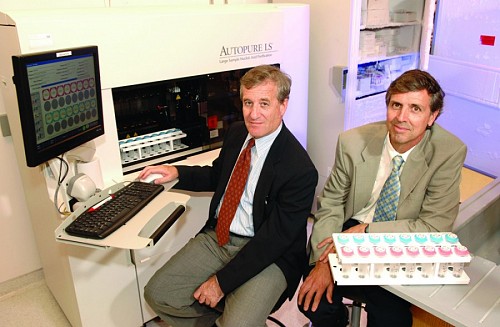By Bill Snyder
October 16, 2009

Dan Roden, M.D., left, and Dan Masys, M.D.
Can genetic information embedded in patients' electronic medical records help improve treatment outcomes and avoid adverse drug effects?
That's the question researchers at Vanderbilt University Medical Center will try to answer thanks to a two-year, $6.4 million "Grand Opportunities" stimulus grant they received last month from the National Institutes of Health.
"If we hit a home run, it could actually change care," said Dan Masys, M.D., chair of Biomedical Informatics at Vanderbilt.
"If we are able to find a set of genetic variants that reliably predict whether you would get an adverse effect of a medicine," Masys said," …then we might imagine doing a panel of genotyping on every single person who comes through the door."
Masys is leading the study with Dan Roden, M.D., director of the Oates Institute for Experimental Therapeutics. Roden, who also is assistant vice chancellor for Personalized Medicine, predicted that the study will help identify genetic variations "that we think really ought to be in people's charts."
The study, called "VESPA," for "Vanderbilt Electronic Systems for Pharmacogenomic Assessment," will utilize Vanderbilt's massive DNA databank, "BioVU."
The databank contains more than 67,000 DNA samples and their matching medical records that have been "de-identified," meaning that all personal information has been stripped away to guarantee patients' anonymity.
The researchers will try to determine whether responses to certain drugs as detailed in medical records could have been predicted by changes or variations in the corresponding DNA samples. "The goal is to use BioVU as a platform for discovery for what really matters …and what makes a difference," Roden said.
In 2006, the last year for which good data are available, Americans spent nearly $220 billion on prescription drugs. Yet physicians have not been able to predict with certainty which patients will respond to the drugs they are prescribed, and which will experience serious, even life-threatening side effects.
Data suggest that tens of thousands of hospitalized patients die of adverse drug effects each year in the United States. That's "a colossal waste," Masys said, "both in terms of human suffering that could be avoided but also in terms of dollars spent that were needless."
VESPA is part of the "Grand Opportunities" program established by the NIH and funded by federal stimulus money.
The program's goal is to accelerate research likely to have "high, short-term impact" on public health and health care delivery.
A "signature project" of the National Institute of General Medical Sciences and the office of NIH Director Francis Collins, M.D., Ph.D., it is one of three Grand Opportunities grants received by Vanderbilt researchers this year.
This article originally appeared on the Vanderbilt Reporter website. Reposted with permission.